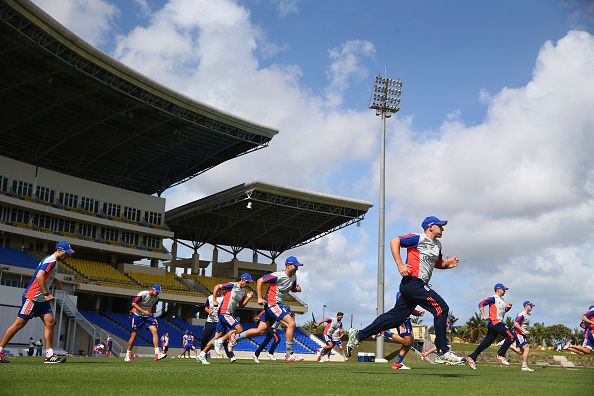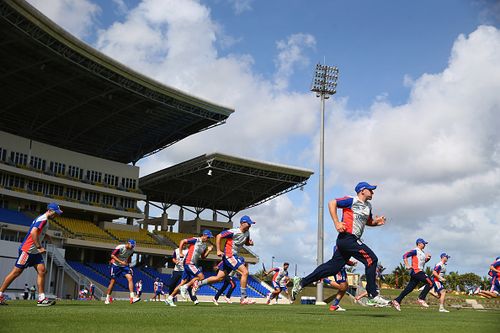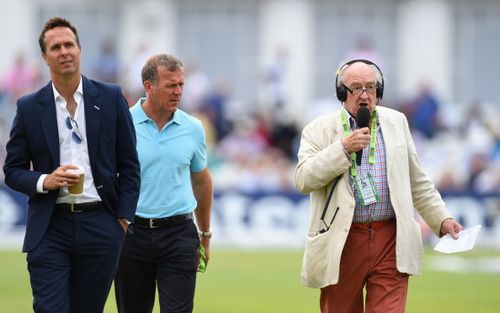
England must learn from Australia if they are to achieve real regime change

A lot can happen in two years. The last time England hosted Australia in an Ashes series, the former exuded serenity while the latter were embroiled in turmoil. Darren Lehmann was drafted in as Australia’s emergency coach following the sacking of Mickey Arthur due to homework-gate, David Warner was engaged in a fracas with Joe Root in a bar, and to cap it off, they failed to win a single Test on tour, going down 3-0.
Fast-forward to the present and their respective roles have totally reversed. Australia have resumed their place as top dogs – rounding off a brilliant summer with a World Cup victory on home soil – while English cricket has speedily crashed to its lowest ebb. The Kevin Pietersen saga rages on, emblazened further by their inability to reach the quarter-finals in a humliating World Cup campaign.
Captain Alastair Cook is a man wrestling not just for team success but for individual form, and the gaping holes left by the stress-related departure of Jonathan Trott along with the retirement of spinner Graeme Swann are yet to be filled. The lone saving grace is that it appears impossible for things to get any worse.
Like in any team sport, prolonged failures inevitably result in eyes swivelling towards the management. Plenty within the England and Wales Cricket Board have become personae non gratae with the public. The most potent two are the now-sacked managing director Paul Downton, and coach, Peter Moores – who the former hired. Chairman of selectors James Whitaker could be set for the axe too. Shoehorned in, Downton began his duties in February 2014 after England’s embarrassing winter whitewash in the return Ashes. In that time he oversaw a home Test series defeat to Sri Lanka, two first-round exits in ICC events and the excruciating removal of Cook as ODI leader.
Moreover, his troubles just mounted by maintaining a hardened stance against Pietersen – a move that has split opinion between both English fans and the press. In fact, Downton’s only solace during his 14-month tenure came courtesy of a 3-1 triumph in the five-dayers over a vacant-looking India. His sacking on Wednesday would not even have surprised those who define cricket as “one of those chirping insects”.
Moores is under increasing scrutiny
For now, Moores survives, although a recent report reckons he too is on borrowed time. His suggestion that the logical way to unpick England’s World Cup loss to Bangladesh was by “looking at the data” left him at the mercy of a country addicted on mickey-taking. The blunt truth though is that he doesn’t command respect, he never has. Scars formed in the first Moores reign haven’t healed. The original Pietersen debacle lurks as a shadow, as does his apparent allergy to attacking tactics.
If it isn’t batting or bowling that has cost England under Moores it has been passive captaincy – the stand-out contributor to them losing two Tests (and subsequently series) in particular: one against West Indies six years ago, the other, in the aforementioned two-match clash with Sri Lanka last summer. In each case England were denied triumphs by one wicket because of a lack of conviction, their affection for personal milestones and a policy to eliminate even the slimmest prospects of defeat – all illustrated by their reluctance to push the declaration button.
The final outcome of such conservatism? Two series lost 1-0. This is no coincidence. A defensive, negative approach has twice been allowed to seep in under Moores’ watch. It’s a theme that has filtered down to the shorter formats too, where beating a Test nation seems a rarer occurrence nowadays than being turned over by an Associate.
England are, across the board, in desperate need of change. There is a shred of optimism in that Colin Graves and Tom Harrison – the ECB’s new chairman and chief executive - look keen to shake things up, as Harrison’s Operation Downton and Graves’ bridge-building with Pietersen have indicated. Ousting Moores as swiftly as possible would signal real intent for a revolution. From there? Well, much could be gained by learning from Australia.
In search of a Boof
Parachuting Lehmann has proved to be an inspired move for the Aussies. An English “Boof” would be a well-prescribed ointment. For all of the analysing, data-crunching, diets – an absurd 82-page dietary plan was sent to caterers when they last toured Down Under – cricket is a simple game. Players bat, some bowl, catches are snaffled and the odd run-out is inflicted. After being drowned in complexity, what England require now is simplicity.
An ex-player’s involvement would go a long way. Someone who connects with his squad, a figure that is unworried about having a beer with his players, but at the same time, a coach who can assert authority when it’s called for. It’s not an idealistic theory either. Lehmann quickly repaired the damage caused by Arthur and created a feared force in a matter of months.
As far as the new director is concerned, the ECB have exacted some administrative changes. Gone is the ‘managing’ part, the next director will concentrate solely on the national outfit. Ashes winning captain Michael Vaughan and gritty veteran, Alec Stewart, have expressed interest in acquiring the title.

Vaughan strikes as something of a radical. His promotion of an enhanced Twenty20 competition within the English domestic stucture has raised eyebrows, and his vocal displeasure of Moores is also well-documented, although the latter has insinuated that he would be prepared to work together. Experience is offered in the form of Stewart.
The 52-year-old enjoyed a 14-year international career and is the current director of cricket at Surrey. Andrew Strauss has also thrown his hat in the ring but given he has captained under Moores, a rekindling of their relationship would present more problems than solutions.
England still reluctant to adapt to the modern game
Since he is yet to receive the boot, predicting Moores’ successor is a tricky task, but two stinging issues must be resolved for whoever takes the poisoned chalice. Firstly, all silliness over Pietersen has to end. Contrary to how it looks, English cricket is not a soap opera, and if it were, the parts wouldn’t be meant for drama queens.
If he scores runs for Surrey, he warrants consideration for the Ashes and the following South Africa tour later in the year. Sensibility is in order in a period of such peril. England are not in a position to pick and choose on personality. For the good of the country, they have to select their best XI. If Pietersen is in that XI then so be it.
Long-term, England have to embrace positivity, and more so in limited-overs, the modern game. When in control, going for the jugular should be the modus operandi; not sitting back, protecting an advantage, and waiting for the opposition to succumb. On the ODI front, somebody needs to project the message that 300 is an inferior score now, never mind 250. There are bruising batsmen in the county game salivating for an opportunity on the big stage. Jason Roy, Sam Billings and David Willey all have sturdy cases for a big spot, all three have the six-hitting ability to fire totals way beyond that 300 mark.
Cricketers-turned-commentators understand the concepts ruling the modern game. Perhaps attention should shift their way once the coaching slot becomes vacant. Former captains Michael Atherton and Nasser Hussain regularly pontificate from afar, more reckless alternatives exist than letting one of them impose their manifesto on England – Hussain already had one crack at it in Bollywood movie Patiala House. But in all seriousness, either has the gumption to be an English Boof Lehmann.
In all walks of life change is inevitable, it can only be delayed. Transition is afoot, the ECB must now ensure they adopt fresh, uncomplicated measures that both players and fans can connect with, not an extension of the dull, outdated style that has led them to this mess.